Darwin: from horns to roots
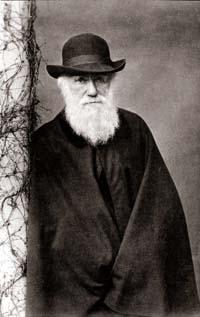
Kepa Altonaga: It is true that he brought many things, but I would say that, in case of choosing the boss, he brought a paradigm. Thanks to Darwin, evolution has become a paradigm to which we adapt all data in science. And not only in biology, but also in astronomy when we talk about the birth and evolution of stars, or in social issues, when we talk about a strike, about its evolution; or in computer science... It is a paradigm that we see in any field.
Now, therefore, we have internalized this paradigm and think about it. At the time, when he published The Origin of Species, I would say that there were two contributions. On the one hand is the idea of evolution. The idea was not new, already mentioned in classical Greece, and then Lamarck and other pioneers. But Darwin gave consistency to this idea, based on a thousand and one data, so that, after Darwin's book, evolution was considered accepted in most fields.
On the other hand, Darwin proposed a mechanism to explain evolution: natural selection. And that was more discussed. XX. At the beginning of the twentieth century, for example, in some books an eclipse of evolution is mentioned, but not of evolution, but of natural selection. And then the idea of natural selection is accepted again.
Therefore, all of Darwin's contributions were not of the same level, but he did: he put man in his place. As Copernicus once placed the Earth in place, Darwin snatched man from the position of king or queen of creation and placed him among other living creatures in a lower place.
Begoña Juice: I totally agree with Kepa. Darwin collected some of the preconceived ideas and contributed new ideas: one, that all living beings are relatives, that we come from a common ancestor and that some evolve from others, and two, through which mechanism the evolution occurs, that is, natural selection.
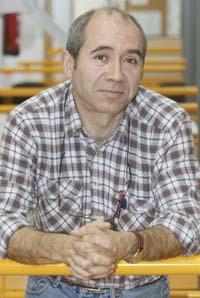
C. C. A. A. This question is quite discussed. In fact, it is often said that creating Wallace's work then also shows in part that this idea was in the environment. It seems that the then England, the model of society that precedes the industrial revolution, and a kind of humus, would be ideas that, by chance, should arise.
Mayr, however, says there were facts or data, but there were no inferences between the data and that Darwin did those inferences on the one hand and, surprisingly, Wallace was in the Malaysia area. And as that happened at the same time, many believe that the idea was set. But Mayr does not agree and, therefore, I do not agree either, because, if not, that idea would not generate that contrariety he had created in England.
C. C. A. A. Yes, and a lot. As mentioned above, the idea of evolution was accepted. The novelty was the natural selection. And now, looking back, we can think that, as there was then great competition in English society, Darwin took him to the natural world. Mayr, however, does not believe that this was so, but rather drew the idea of the experience of the breeders.
B. B. J. That is. I think Darwin's personal situation was also very advantageous. Formatively he worked in different fields: zoology, botany, geology... In addition, he had his observations, collected on a five-year journey. There are also those who talk about Malthus and the influence of competition on society. But, besides all this, there is that of the breeders. The breeders chose the animals with the best characteristics and then crossed them to obtain the descendants with these good characteristics.
Darwin did not do experiments, but somehow the experience of the breeders was for Darwin an experiment of hypothesis of natural selection. In addition, the first chapter of the book “The origin of species” focuses on genetic improvement. In this case it was by the action of man, who led him to nature. There is no human intervention, but in the environment there are some conditions that make the selection occur.
C. C. A. A. Yes, that's one of the inferences Mayr mentions. Everyone knew the work of the breeders, but Darwin was able to draw from him a new idea. And the trip is also there. I read to Gouldi that the journey of the trip was decisive. It had the opportunity to know places and phenomena such as earthquakes, volcanoes, rainforest where competition between species is evident... This was very useful for Darwin.
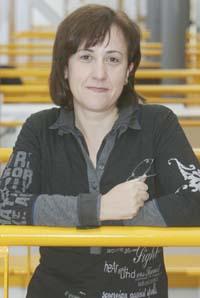
For example, Gould mentions that at the same time Prince Kropotkin also travelled. He travelled through Siberia and he is another world: empty, cold, with very harsh conditions... And there it seems that the species, instead of competing, are friendly. There is competition, of course, but it is not so obvious. From that apparent friendship, Prince Kropotkin brought the idea of anarchism. There it is seen that the journey Darwin made was really important to develop his ideas.
C. C. A. A. Besides the ones we mentioned, I think that in 1839 there was another moment of great importance, that is to say, that once finished the trip was already in London. The collection gathered along the journey was distributed among experts, and an ornithologist, John Gould, identified the Galapagos birds, among which were the txontes that later became famous. But the txontes did not have as much influence as many believe in Darwin's thought, since the problem of the txontes was too difficult to explain at that time. This has been explained later and, through an anachronism, it has been presented many times as if Darwin had explained it. It wasn't really like that.
It did affect the identification of the ornithologist with three species of foxes. Each of these species of foxes belonged to an island of the Galapagos and, in addition, there was another similar species in Ecuador. And that was decisive for Darwin. And it is that, being the closest relative in the continent, even if it seems, there are three different species in its environment, and that was a flash.
And another thing I want to highlight is that he spent eight or ten years studying sea acorns. And that long work, why? It seems that with it he wanted to obtain the recognition among the experts so that his ideas also had recognition.
B. B. J. I think they had a counterposed effect, some showed up in favor and others against. The opposites were based primarily on religion. As we have said before, Darwin placed man among other animals, which had a huge impact among the religious. Others, on the other hand, were in favor, but then they had to abandon religion. So, I think Darwin's ideas created an inner battle in people.
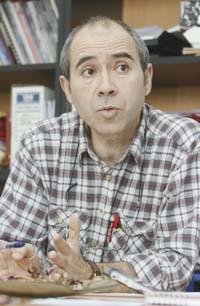
In addition to society, it had a great influence among scientists. It should be noted that Darwin's book was the subject of a discussion at Oxford, the British Association for the Progress of Science, between researchers and a bishop. So that debate had about a thousand attendees. Thomas Huxley explained the relationship between man and monkey, and then the bishop asked him what his grandfather, a respectable man or a monkey preferred.
C. C. A. A. There are many anecdotes, but also influenced, outside science, a philosopher called Spencer. He spoke of social Darwinism, that is, he applied the ideas of Darwin in society. But Darwin himself did not enter into such debates.
B. B. J. It is true that Darwin never showed up in public debates. Apparently, his wife was very believer and was not expressed for not speaking or not speaking.
C. C. A. A. But he had defenders, Huxley was one of them in England, called Darwin's bulldoge. In Germany, the influence of Ernst Haeckel was enormous. He applied Darwinism to the human being and had a great influence on the continent. Darwinism came to Spain with Haeckel's books translated into French.
And often the social is forgotten and it draws attention how it was sometimes interpreted. For example, Darwinism had much more acceptance in South America than in Europe. Why? Because social struggles were much more cruel than in Europe, there were slaves and indigenous people, and the older ones were based on Darwinism to justify their power.
B. B. J. And that being Darwin himself anti-slavery. It is a clear example of the misuse of ideas.
C. C. A. A. Yes, but there was a part of society willing to accept Darwinism because it allowed them to scientifically justify their behavior. And there are data from the Argentine Basques, and there it is seen that all were Darwinists in that sense. In Spain the opposite occurred: the Darwinists were socialists. In fact, in Spain the church had a lot of strength and then Darwinism was progressivism.
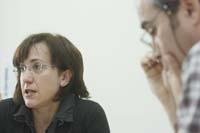
B. B. J. However, in Spain the research of evolution began very late.
C. C. A. A. We have already mentioned that evolution was accepted, but then an eclipse occurred. Due to natural selection, it remained shaded for 50 years.
B. B. J. In fact, at that time, evolution and genetics were very separate. In my opinion, the greatest emptiness in Darwin's theory was that there was no genetic basis. Darwin, for example, did not know Mendel, although they were from the same time. But Mendel's works were not known and each was separately.
And geneticists discovered that mutations occurred. Between 1900 and 1920, mutation is important as an evolutionary process and natural selection is eclipsed.
C. C. A. A. And not only that: Neolamarckismo appeared, it was a boom of finalism... the four and five lines grew when natural selection fell. At that time Weissman was the only defender.
B. B. J. That is, and the geneticists were against. Subsequently, there was a confluence of the theories of natural selection and Mendel's inheritance, giving rise to neo-Darwinian theory, around 1930-1940. And then there are very important researchers, especially in population genetics: Fisher, Wright and Haldane, the three giants. By then the genes and alleles were already known, because the mathematical models that developed from the frequency of these alleles are still useful.
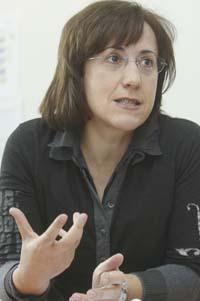
C. C. A. A. Bego, you mentioned those three and I have not heard Dobzhansky.
B. B. J. Yes, now that comes. The first performed a theoretical corpus and Dobzhansky experimented with flies in the laboratory.
C. C. A. A. And he was also a naturalist.
B. B. J. Indeed. And that famous phrase is yours, no? "In biology, nothing makes sense if it is not from an evolutionary point of view." From there, in the 1940s the idea of evolution was extended to other fields, zoology, botany, geology... and then other things were developed.
C. C. A. A. Well, the biggest vacuum is in genetics. He needs a variability to explain his theory, sees that there is variability, but since he did not know genes, he could not give a direct explanation. Then, at some points it is lamarckista...
B. B. J. Yes, and accept the inheritance of flowery traits. And before he accepted the confused inheritance, that the characteristics of the father and of the mother are mixed in offspring. Then, when Mendel's work is known, all this remains, of course, totally discarded.
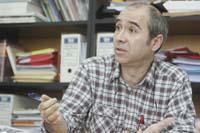
C. C. A. A. What did he propose, gécoles or… how was that?
B. B. J. Yes, you see that there has a gap for inheritance and explanation, and proposes the theory of pangenesis, and that there are dispersed geons in the body... It must be taken into account that breeders and phenotype worked and was still to develop genetics. Each thing must be seen at the time, and they still did not have enough knowledge to explain well how the changes and inheritance occurred from one generation to another.
C. C. A. A. Another of the criticisms of many is that Darwin loaded too much "Natura non facit saltus". That is, Darwin was a graduate, he believes that in nature there are no jumps. He took this idea from geologist Lyell. Most of the geologists at the time were catastrophic, but if catastrophism is accepted, everything is worth even the most scientific explanations. Lyell does not accept such explanations. According to him, the history of the Earth is based on phenomena similar to those of today. Darwin took this idea of geology and applied it to biology, that is, he proposed that the changes occur little by little.
B. B. J. And Pedro says there are those who believe there are changes jumping and that Darwin did not see it.
C. C. A. A. There was a problem. The prestigious physicist Lord Kelvin conducted an experiment and claimed that the Earth was 60 million years old. And 60 million years for Darwin was little time to explain evolution, with such gradual changes. Huxley said to him: "Do you see? There we need something more violent." Wallace, on the other hand, did not worry at all, "The whole mechanism was going to be faster," he said. Therefore, gradualism was discussed from the beginning. Then came the mutationists, who were Goldsmith and, in fact, saltationists. Today, one of the main debates is there: the influence of saltationism, the balancing act... in this environment. For example, Gould and Dawkins are on each side.
B. B. J. I don't think the debate is so much. The theories of evolution, in plural, accept new things. For example, we now know that a mutation that occurs in a regulating gene can have a huge effect and that new things can be created with a single mutation. The problem is how this change is dispersed in a population. Because change has occurred in an individual and we speak of populations, not of individuals. That is the question. There can be two things, gradual changes and even jumps. Now, with the study of the genome, we are receiving a lot of information and I don't think both are contradictory. It is called Evodevo.
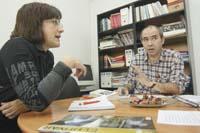
C. C. A. A. Evodevo, evolution and development, evolution and development.
B. B. J. I think many answers can come from that realm.
B. B. J. No, no, neither the debate nor the theory of evolution. And I think the year of Darwin will be very useful to gather, gather information and debate experts from different fields.
Buletina
Bidali zure helbide elektronikoa eta jaso asteroko buletina zure sarrera-ontzian











